资源与评价
- 格式:doc
- 大小:171.50 KB
- 文档页数:21
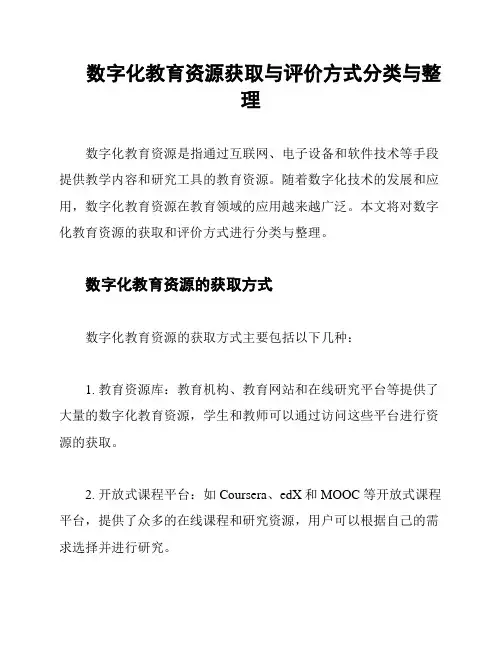
数字化教育资源获取与评价方式分类与整理数字化教育资源是指通过互联网、电子设备和软件技术等手段提供教学内容和研究工具的教育资源。
随着数字化技术的发展和应用,数字化教育资源在教育领域的应用越来越广泛。
本文将对数字化教育资源的获取和评价方式进行分类与整理。
数字化教育资源的获取方式数字化教育资源的获取方式主要包括以下几种:1. 教育资源库:教育机构、教育网站和在线研究平台等提供了大量的数字化教育资源,学生和教师可以通过访问这些平台进行资源的获取。
2. 开放式课程平台:如Coursera、edX和MOOC等开放式课程平台,提供了众多的在线课程和研究资源,用户可以根据自己的需求选择并进行研究。
3. 自建教育资源:教师和学生可以通过自己创作和整理教育资源,例如制作教学视频、PPT和练题等,以满足自己的教学和研究需求。
4. 社交媒体平台:一些社交媒体平台上也存在大量的教育资源,用户可以通过搜索和分享功能获取到这些资源。
数字化教育资源的评价方式对于数字化教育资源的评价,主要可以从以下几个角度进行:1. 内容质量:评价一份数字化教育资源的内容质量,包括教学内容的准确性、完整性和实用性等方面。
2. 用户评价:通过用户的评价和反馈,了解该资源在实际使用中的效果和用户满意度。
3. 教学效果:评价数字化教育资源对研究者的教学效果,包括对知识掌握程度、兴趣和研究动力的影响等。
4. 研究体验:评价数字化教育资源的用户体验,包括资源的界面设计、交互方式、研究过程的流畅性等。
5. 技术支持:评价数字化教育资源所提供的技术支持和服务水平,包括故障处理、使用指导和对用户需求的快速响应等。
总结数字化教育资源的获取方式多样化,学生和教师可以通过教育资源库、开放式课程平台、自建资源和社交媒体等渠道进行获取。
对于评价数字化教育资源,需要从内容质量、用户评价、教学效果、研究体验和技术支持等角度进行综合考量。
这样有助于学生和教师选取适合自己需求的高质量教育资源,并提升教育的效果和研究的体验。
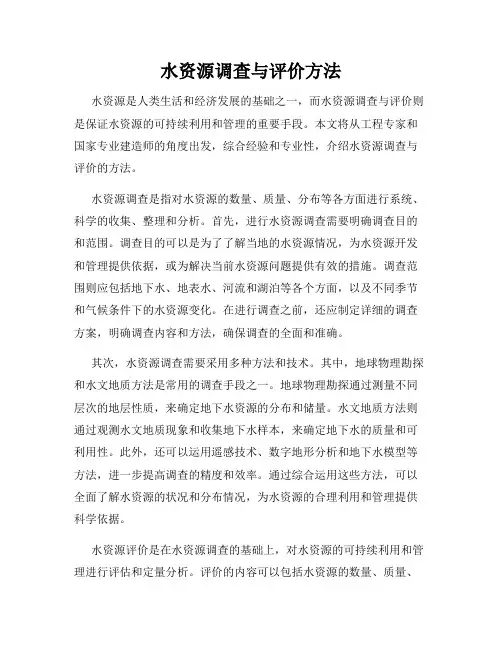
水资源调查与评价方法水资源是人类生活和经济发展的基础之一,而水资源调查与评价则是保证水资源的可持续利用和管理的重要手段。
本文将从工程专家和国家专业建造师的角度出发,综合经验和专业性,介绍水资源调查与评价的方法。
水资源调查是指对水资源的数量、质量、分布等各方面进行系统、科学的收集、整理和分析。
首先,进行水资源调查需要明确调查目的和范围。
调查目的可以是为了了解当地的水资源情况,为水资源开发和管理提供依据,或为解决当前水资源问题提供有效的措施。
调查范围则应包括地下水、地表水、河流和湖泊等各个方面,以及不同季节和气候条件下的水资源变化。
在进行调查之前,还应制定详细的调查方案,明确调查内容和方法,确保调查的全面和准确。
其次,水资源调查需要采用多种方法和技术。
其中,地球物理勘探和水文地质方法是常用的调查手段之一。
地球物理勘探通过测量不同层次的地层性质,来确定地下水资源的分布和储量。
水文地质方法则通过观测水文地质现象和收集地下水样本,来确定地下水的质量和可利用性。
此外,还可以运用遥感技术、数字地形分析和地下水模型等方法,进一步提高调查的精度和效率。
通过综合运用这些方法,可以全面了解水资源的状况和分布情况,为水资源的合理利用和管理提供科学依据。
水资源评价是在水资源调查的基础上,对水资源的可持续利用和管理进行评估和定量分析。
评价的内容可以包括水资源的数量、质量、分布、供需状况、水生态环境等各个方面。
水资源评价的方法较为复杂,需要考虑多个因素的影响。
一般来说,评价方法可以分为定性评价和定量评价两种。
定性评价主要依靠专家经验和判断,通过对各种因素的综合分析,来评估水资源的状况和可利用性。
而定量评价则更加科学和精确,可以通过数学模型和计算方法,来定量分析水资源的供需平衡、水质状况和水资源的脆弱性等指标。
定量评价还可以考虑不同情景下的水资源利用规划和管理策略,为决策提供科学依据。
此外,为了提高水资源调查与评价的能力和水平,还需要不断加强技术研发和人员培训。
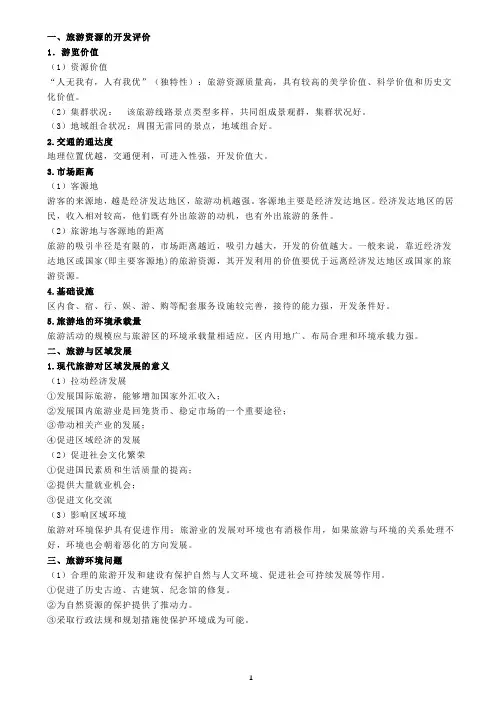
一、旅游资源的开发评价1.游览价值(1)资源价值“人无我有,人有我优”(独特性):旅游资源质量高,具有较高的美学价值、科学价值和历史文化价值。
(2)集群状况:该旅游线路景点类型多样,共同组成景观群,集群状况好。
(3)地域组合状况:周围无雷同的景点,地域组合好。
2.交通的通达度地理位置优越,交通便利,可进入性强,开发价值大。
3.市场距离(1)客源地游客的来源地,越是经济发达地区,旅游动机越强。
客源地主要是经济发达地区。
经济发达地区的居民,收入相对较高,他们既有外出旅游的动机,也有外出旅游的条件。
(2)旅游地与客源地的距离旅游的吸引半径是有限的,市场距离越近,吸引力越大,开发的价值越大。
一般来说,靠近经济发达地区或国家(即主要客源地)的旅游资源,其开发利用的价值要优于远离经济发达地区或国家的旅游资源。
4.基础设施区内食、宿、行、娱、游、购等配套服务设施较完善,接待的能力强,开发条件好。
5.旅游地的环境承载量旅游活动的规模应与旅游区的环境承载量相适应。
区内用地广、布局合理和环境承载力强。
二、旅游与区域发展1.现代旅游对区域发展的意义(1)拉动经济发展①发展国际旅游,能够增加国家外汇收入;②发展国内旅游业是回笼货币、稳定市场的一个重要途径;③带动相关产业的发展;④促进区域经济的发展(2)促进社会文化繁荣①促进国民素质和生活质量的提高;②提供大量就业机会;③促进文化交流(3)影响区域环境旅游对环境保护具有促进作用;旅游业的发展对环境也有消极作用,如果旅游与环境的关系处理不好,环境也会朝着恶化的方向发展。
三、旅游环境问题(1)合理的旅游开发和建设有保护自然与人文环境、促进社会可持续发展等作用。
①促进了历史古迹、古建筑、纪念馆的修复。
②为自然资源的保护提供了推动力。
③采取行政法规和规划措施使保护环境成为可能。
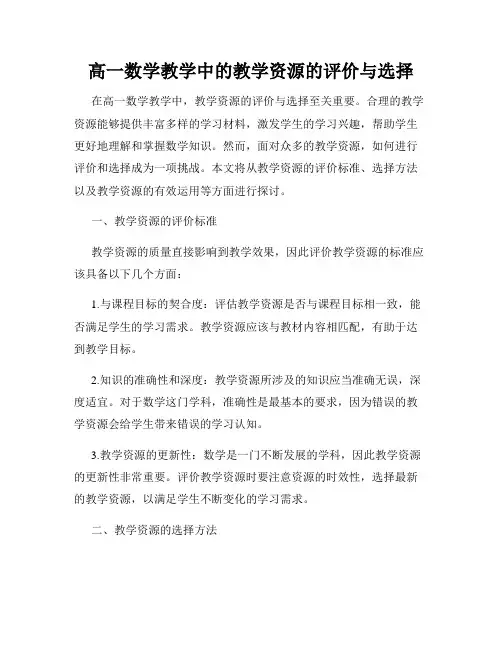
高一数学教学中的教学资源的评价与选择在高一数学教学中,教学资源的评价与选择至关重要。
合理的教学资源能够提供丰富多样的学习材料,激发学生的学习兴趣,帮助学生更好地理解和掌握数学知识。
然而,面对众多的教学资源,如何进行评价和选择成为一项挑战。
本文将从教学资源的评价标准、选择方法以及教学资源的有效运用等方面进行探讨。
一、教学资源的评价标准教学资源的质量直接影响到教学效果,因此评价教学资源的标准应该具备以下几个方面:1.与课程目标的契合度:评估教学资源是否与课程目标相一致,能否满足学生的学习需求。
教学资源应该与教材内容相匹配,有助于达到教学目标。
2.知识的准确性和深度:教学资源所涉及的知识应当准确无误,深度适宜。
对于数学这门学科,准确性是最基本的要求,因为错误的教学资源会给学生带来错误的学习认知。
3.教学资源的更新性:数学是一门不断发展的学科,因此教学资源的更新性非常重要。
评价教学资源时要注意资源的时效性,选择最新的教学资源,以满足学生不断变化的学习需求。
二、教学资源的选择方法在选择教学资源时,应该根据具体的教学需求和学生特点进行综合考虑。
1.了解学生的学习需要:了解学生的学习水平、学习方法和学习习惯等因素,有针对性地选择教学资源。
2.综合评估教学资源的质量:通过查阅教学资源的相关评价、阅读评论等方式,综合评估教学资源的质量,包括是否准确、完整、易读等方面。
3.与教学内容的契合度:选择与教学内容相匹配的教学资源,能够为学生提供帮助和启示,促进学生对数学知识的理解。
三、教学资源的有效运用选定教学资源后,如何有效地运用也是非常重要的。
1.合理安排教学资源的使用顺序:根据教学的逻辑和难易程度,合理安排教学资源的使用顺序,确保教学的连贯性。
2.多角度呈现知识点:利用不同的教学资源,从不同的角度呈现知识点,帮助学生全面理解和掌握数学知识。
3.培养学生的综合运用能力:通过选择适当的教学资源,引导学生进行数学思维的训练和综合运用,培养学生的创新能力和解决问题的能力。
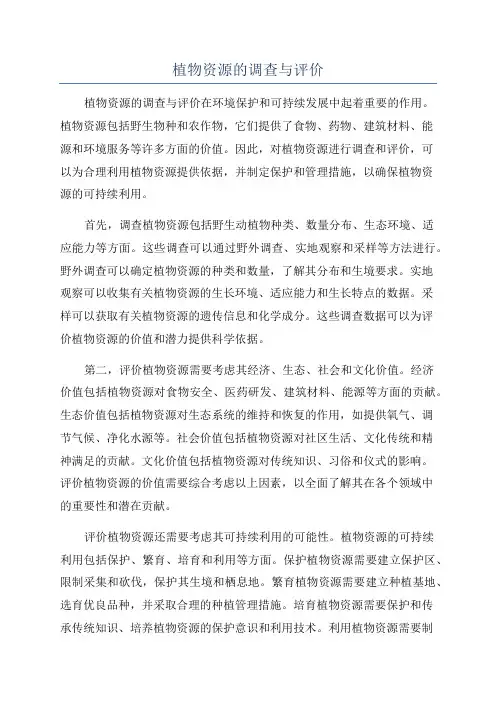
植物资源的调查与评价植物资源的调查与评价在环境保护和可持续发展中起着重要的作用。
植物资源包括野生物种和农作物,它们提供了食物、药物、建筑材料、能源和环境服务等许多方面的价值。
因此,对植物资源进行调查和评价,可以为合理利用植物资源提供依据,并制定保护和管理措施,以确保植物资源的可持续利用。
首先,调查植物资源包括野生动植物种类、数量分布、生态环境、适应能力等方面。
这些调查可以通过野外调查、实地观察和采样等方法进行。
野外调查可以确定植物资源的种类和数量,了解其分布和生境要求。
实地观察可以收集有关植物资源的生长环境、适应能力和生长特点的数据。
采样可以获取有关植物资源的遗传信息和化学成分。
这些调查数据可以为评价植物资源的价值和潜力提供科学依据。
第二,评价植物资源需要考虑其经济、生态、社会和文化价值。
经济价值包括植物资源对食物安全、医药研发、建筑材料、能源等方面的贡献。
生态价值包括植物资源对生态系统的维持和恢复的作用,如提供氧气、调节气候、净化水源等。
社会价值包括植物资源对社区生活、文化传统和精神满足的贡献。
文化价值包括植物资源对传统知识、习俗和仪式的影响。
评价植物资源的价值需要综合考虑以上因素,以全面了解其在各个领域中的重要性和潜在贡献。
评价植物资源还需要考虑其可持续利用的可能性。
植物资源的可持续利用包括保护、繁育、培育和利用等方面。
保护植物资源需要建立保护区、限制采集和砍伐,保护其生境和栖息地。
繁育植物资源需要建立种植基地、选育优良品种,并采取合理的种植管理措施。
培育植物资源需要保护和传承传统知识、培养植物资源的保护意识和利用技术。
利用植物资源需要制定合理的政策和法规,确保其可持续利用和开发。
评价植物资源的可持续利用需要考虑其生态特性、适应能力、可再生能力和可替代性等方面的因素,并制定相应的管理措施和政策。
综上所述,植物资源的调查与评价是保护和可持续利用植物资源的重要基础。
通过调查,可以获取植物资源的基本信息和种群动态,为评价其价值和潜力提供科学依据。
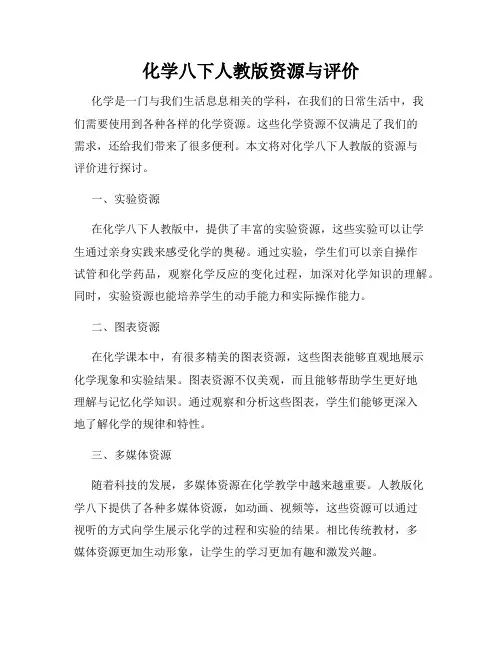
化学八下人教版资源与评价化学是一门与我们生活息息相关的学科,在我们的日常生活中,我们需要使用到各种各样的化学资源。
这些化学资源不仅满足了我们的需求,还给我们带来了很多便利。
本文将对化学八下人教版的资源与评价进行探讨。
一、实验资源在化学八下人教版中,提供了丰富的实验资源,这些实验可以让学生通过亲身实践来感受化学的奥秘。
通过实验,学生们可以亲自操作试管和化学药品,观察化学反应的变化过程,加深对化学知识的理解。
同时,实验资源也能培养学生的动手能力和实际操作能力。
二、图表资源在化学课本中,有很多精美的图表资源,这些图表能够直观地展示化学现象和实验结果。
图表资源不仅美观,而且能够帮助学生更好地理解与记忆化学知识。
通过观察和分析这些图表,学生们能够更深入地了解化学的规律和特性。
三、多媒体资源随着科技的发展,多媒体资源在化学教学中越来越重要。
人教版化学八下提供了各种多媒体资源,如动画、视频等,这些资源可以通过视听的方式向学生展示化学的过程和实验的结果。
相比传统教材,多媒体资源更加生动形象,让学生的学习更加有趣和激发兴趣。
四、课堂资源在化学八下人教版中,还提供了丰富的课堂资源,如课件、练习题等。
这些课堂资源能够帮助教师更好地组织教学内容,让学生更好地掌握和应用化学知识。
通过课堂资源的运用,学生可以在教师的指导下进行学习和研究,提高学习效果。
综上所述,化学八下人教版提供了丰富的资源,通过这些资源可以帮助学生更好地学习和理解化学知识。
实验资源、图表资源、多媒体资源和课堂资源的应用,不仅丰富了化学教学的方式,还提高了学生的学习兴趣和学习效果。
相信这些资源的运用将有助于促进学生对化学学科的兴趣和深入了解。
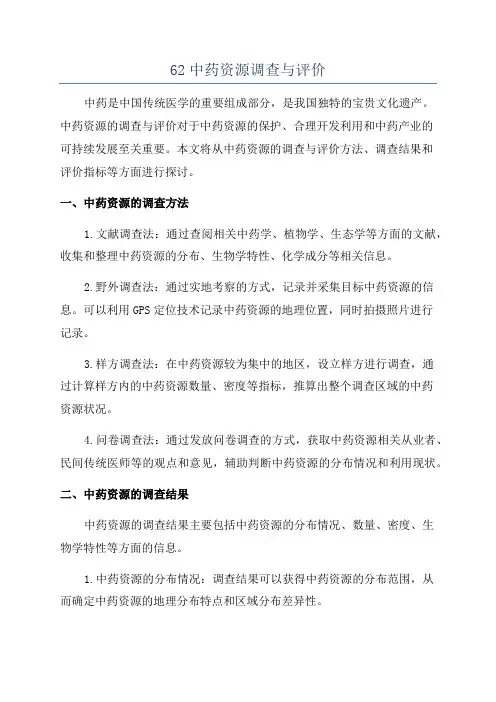
62中药资源调查与评价中药是中国传统医学的重要组成部分,是我国独特的宝贵文化遗产。
中药资源的调查与评价对于中药资源的保护、合理开发利用和中药产业的可持续发展至关重要。
本文将从中药资源的调查与评价方法、调查结果和评价指标等方面进行探讨。
一、中药资源的调查方法1.文献调查法:通过查阅相关中药学、植物学、生态学等方面的文献,收集和整理中药资源的分布、生物学特性、化学成分等相关信息。
2.野外调查法:通过实地考察的方式,记录并采集目标中药资源的信息。
可以利用GPS定位技术记录中药资源的地理位置,同时拍摄照片进行记录。
3.样方调查法:在中药资源较为集中的地区,设立样方进行调查,通过计算样方内的中药资源数量、密度等指标,推算出整个调查区域的中药资源状况。
4.问卷调查法:通过发放问卷调查的方式,获取中药资源相关从业者、民间传统医师等的观点和意见,辅助判断中药资源的分布情况和利用现状。
二、中药资源的调查结果中药资源的调查结果主要包括中药资源的分布情况、数量、密度、生物学特性等方面的信息。
1.中药资源的分布情况:调查结果可以获得中药资源的分布范围,从而确定中药资源的地理分布特点和区域分布差异性。
2.中药资源的数量与密度:通过采集样方内中药资源的数量或计算样方内中药资源的密度,可以估算出整个调查区域的中药资源数量和分布密度。
3.中药资源的生物学特性:通过调查记录中药资源的形态特征、生长习性、采收季节等信息,了解中药资源的生物学特性,为中药资源的保护和合理开发利用提供依据。
三、中药资源的评价指标中药资源的评价指标可以从生物学、化学、经济和社会等方面进行评价。
1.生物学评价指标:包括中药资源的种类丰富度、生物多样性、种群结构等方面的指标,反映了中药资源的生物学价值。
2.化学评价指标:包括中药资源的有效成分含量、化学成分物种、药效评价等方面的指标,反映了中药资源的化学特性和药用价值。
3.经济评价指标:包括中药资源的产量、市场价格、利用价值等方面的指标,反映了中药资源的经济价值和可持续利用性。
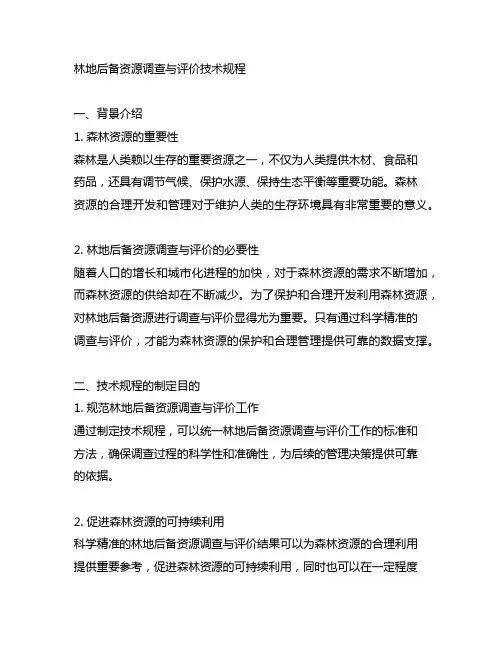
林地后备资源调查与评价技术规程一、背景介绍1. 森林资源的重要性森林是人类赖以生存的重要资源之一,不仅为人类提供木材、食品和药品,还具有调节气候、保护水源、保持生态平衡等重要功能。
森林资源的合理开发和管理对于维护人类的生存环境具有非常重要的意义。
2. 林地后备资源调查与评价的必要性随着人口的增长和城市化进程的加快,对于森林资源的需求不断增加,而森林资源的供给却在不断减少。
为了保护和合理开发利用森林资源,对林地后备资源进行调查与评价显得尤为重要。
只有通过科学精准的调查与评价,才能为森林资源的保护和合理管理提供可靠的数据支撑。
二、技术规程的制定目的1. 规范林地后备资源调查与评价工作通过制定技术规程,可以统一林地后备资源调查与评价工作的标准和方法,确保调查过程的科学性和准确性,为后续的管理决策提供可靠的依据。
2. 促进森林资源的可持续利用科学精准的林地后备资源调查与评价结果可以为森林资源的合理利用提供重要参考,促进森林资源的可持续利用,同时也可以在一定程度上减少因资源过度开发而带来的生态环境问题。
三、技术规程的主要内容1. 调查对象和范围(1)明确调查对象:明确调查的林地后备资源对象,包括林木、草本植物、野生动物等。
(2)确定调查范围:确定调查的地理范围,包括具体的地理位置、面积等。
2. 调查方法和工具(1)采用专业工具:制定采用专业的调查工具,包括GPS定位仪、野外调查工具等。
(2)确定调查方法:确定调查的具体方法,包括样方布设、样地调查等。
3. 数据处理和分析(1)数据采集:规定数据采集的要求和标准,包括数据的准确性、完整性等。
(2)数据分析:对采集的数据进行统计分析,得出相应的调查评价结果。
4. 成果报告和应用(1)撰写成果报告:对调查评价结果进行整理撰写成果报告,包括调查数据、分析结果等。
(2)成果应用:确定成果报告的应用方式,包括提供给相关部门、用于决策参考等。
四、技术规程的实施步骤1. 制定调查方案:根据具体的调查对象和范围,制定详细的调查方案,包括调查人员、调查工具、调查时间等。
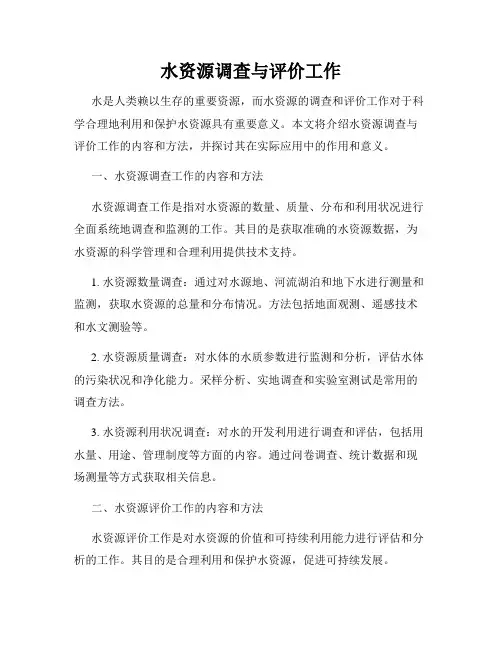
水资源调查与评价工作水是人类赖以生存的重要资源,而水资源的调查和评价工作对于科学合理地利用和保护水资源具有重要意义。
本文将介绍水资源调查与评价工作的内容和方法,并探讨其在实际应用中的作用和意义。
一、水资源调查工作的内容和方法水资源调查工作是指对水资源的数量、质量、分布和利用状况进行全面系统地调查和监测的工作。
其目的是获取准确的水资源数据,为水资源的科学管理和合理利用提供技术支持。
1. 水资源数量调查:通过对水源地、河流湖泊和地下水进行测量和监测,获取水资源的总量和分布情况。
方法包括地面观测、遥感技术和水文测验等。
2. 水资源质量调查:对水体的水质参数进行监测和分析,评估水体的污染状况和净化能力。
采样分析、实地调查和实验室测试是常用的调查方法。
3. 水资源利用状况调查:对水的开发利用进行调查和评估,包括用水量、用途、管理制度等方面的内容。
通过问卷调查、统计数据和现场测量等方式获取相关信息。
二、水资源评价工作的内容和方法水资源评价工作是对水资源的价值和可持续利用能力进行评估和分析的工作。
其目的是合理利用和保护水资源,促进可持续发展。
1. 水资源价值评价:通过对水资源的经济效益、生态价值和社会价值进行评估,确定水资源的综合价值。
常用方法包括货币评估法、替代费用法和生态系统服务价值评估法等。
2. 水资源可持续利用评价:评估水资源的可持续开发利用能力,包括水资源的更新速度、保护措施和适度利用等。
综合应用水量平衡分析、水资源承载力分析等方法进行评价。
3. 水资源环境评价:对水资源利用活动对环境的影响进行评估,包括水体污染、生态破坏和土地沙漠化等方面的内容。
采用环境影响评价和生态系统评估等方法进行综合评定。
三、水资源调查与评价工作的作用和意义水资源调查与评价工作对于水资源的科学管理和合理利用具有重要作用和意义。
1. 为政府决策提供科学依据。
水资源调查与评价数据为政府制定水资源管理政策和制定应对策略提供基础,保障水资源的可持续利用。
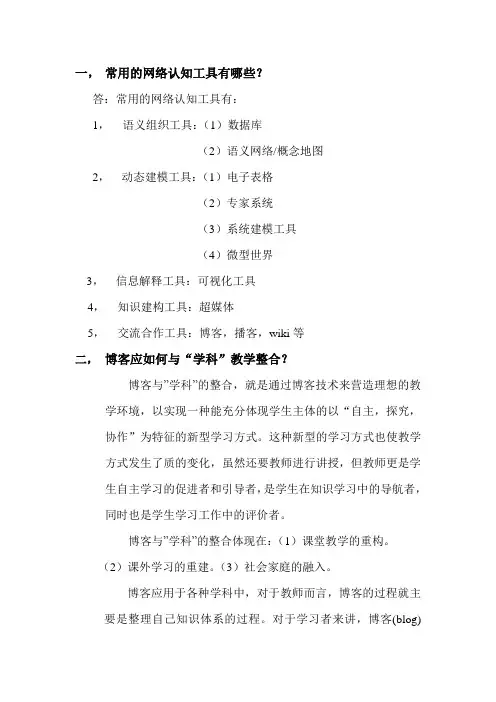
一, 常用的网络认知工具有哪些? 答:常用的网络认知工具有: 1, 语义组织工具:(1)数据库 (2)语义网络/概念地图 2, 动态建模工具:(1)电子表格 (2)专家系统 (3)系统建模工具 (4)微型世界 3, 信息解释工具:可视化工具 4, 知识建构工具:超媒体 5, 交流合作工具:博客,播客,wiki等 二, 博客应如何与“学科”教学整合? 博客与”学科”的整合,就是通过博客技术来营造理想的教学环境,以实现一种能充分体现学生主体的以“自主,探究,协作”为特征的新型学习方式。这种新型的学习方式也使教学方式发生了质的变化,虽然还要教师进行讲授,但教师更是学生自主学习的促进者和引导者,是学生在知识学习中的导航者,同时也是学生学习工作中的评价者。 博客与”学科”的整合体现在:(1)课堂教学的重构。 (2)课外学习的重建。(3)社会家庭的融入。 博客应用于各种学科中,对于教师而言,博客的过程就主要是整理自己知识体系的过程。对于学习者来讲,博客(blog) 的过程就主要是学习者个人构建自己的知识体系的过程。博客的模式是平等的,博客更看重的是参与的过程而不是结果。教师可在博客上对知识,问题提出自己的看法,也可以引经论据,为学生提供学习的资料,给学生一个更广阔的学习空间,这也是体现学生为学习的主体,教师为主导的理念,充分地发挥学生学习的主动性。对于教师或书本上的观点,学生可以通过博客的方式发表他对于这些问题的理解,博客并不要求意见的统一,但要求意见的针对性和独立性。另外,在课程设置的过程中可以设置多个不同的议题,允许学生自由地选择他们感兴趣的议题。博客可以有效地鼓励学生的参与,不光是阅读和评论老师或其它同学的博客日志,更重要的是可以通过建立自已的博客日志,设置自已的议题,与别人分享自已的思想。让师生有一个交流的平台。 三、播客在教育中有什么优势? 1,教师对播客的应用 (1) 创建动态教材 (2) 建立播客网络学习平台 (3) 教学评价的新方式,有利于提高教师的教学技能 2,学生对播客的应用 (1) 深入e-learning应用范畴 (2) 促进语言学科的学习 3,管理者对播客的应用 (1) 建立网络家长学校,为学校和家长之间的交流提供新的方式。 (2) 生成动态开放的教学资源库 总之播客在教育中的优势有:1,作为教学信息发布平台,实现教学资源的动态建设与丰富,构建新型数字校园和视听化的网络学习社区。2,对语言教学中听、说、读训练的支持,扩展传统课程学习,使得用直接方式发展学生语言交流能力的愿望成为现实。3,促进教师专业素质、教育技能的提高与发展,促进学生自主学习与信息素养能力的提高。4,作为师生沟通的重要渠道和学生成长档案袋。 四、WIKI在教育中有什么优势?
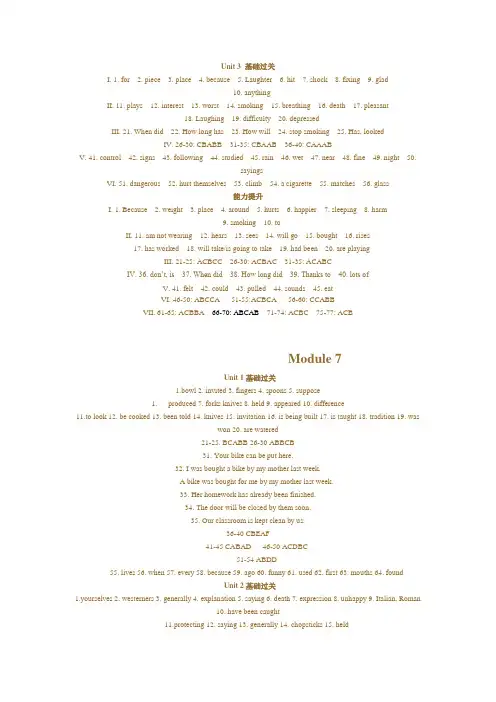
Unit 3 基础过关I. 1. for 2. piece 3. place 4. because 5. Laughter 6. hit 7. shock 8. fixing 9. glad10. anythingII. 11. plays 12. interest 13. worst 14. smoking 15. breathing 16. death 17. pleasant18. Laughing 19. difficulty 20. depressedIII. 21. When did 22. How long has 23. How will 24. stop smoking 25. Has, lookedIV. 26-30: CBABB 31-35: CBAAB 36-40: CAAABV. 41. control 42. signs 43. following 44. studied 45. rain 46. wet 47. near 48. fine 49. night 50.sayingsVI. 51. dangerous 52. hurt themselves 53. climb 54. a cigarette 55. matches 56. glass能力提升I. 1. Because 2. weight 3. place 4. around 5. hurts 6. happier 7. sleeping 8. harm9. smoking 10. toII. 11. am not wearing 12. hears 13. sees 14. will go 15. bought 16. rises17. has worked 18. will take/is going to take 19. had been 20. are playingIII. 21-25: ACBCC 26-30: ACBAC 31-35: ACABCIV. 36. don’t, is 37. When did 38. How long did 39. Thanks to 40. lots ofV. 41. felt 42. could 43. pulled 44. sounds 45. eatVI. 46-50: ABCCA 51-55:ACBCA 56-60: CCABBVII. 61-65: ACBBA 66-70: ABCAB 71-74: ACBC 75-77: ACBModule 7Unit 1基础过关1.bowl2. invited3. fingers4. spoons5. suppose1.produced 7. forks knives 8. held 9. appeared 10. difference11.to look 12. be cooked 13. been told 14. knives 15. invitation 16. is being built 17. is taught 18. tradition 19. waswon 20. are watered21-25. BCABB 26-30 ABBCB31. Your bike can be put here.32. I was bought a bike by my mother last week.A bike was bought for me by my mother last week.33. Her homework has already been finished.34. The door will be closed by them soon.35. Our classroom is kept clean by us.36-40 CBEAF41-45 CABAD 46-50 ACDBC51-54 ABDD55. lives 56. when 57. every 58. because 59. ago 60. funny 61. used 62. first 63. mouths 64. foundUnit 2基础过关1.yourselves2. westerners3. generally4. explanation5. saying6. death7. expression8. unhappy9. Italian, Roman10. have been caught11.protecting 12. saying 13. generally 14. chopsticks 15. held16-20 DBCCC 21-25 BBAAB26. Can/May I help you?/What can I do for you?27. Where is it made/where is it from/where does it come from?28. How much is it?/ How much does it cost?/What’s the price of it?29. What/How about those ones? What/How about that one?30. I’ll take /have/get it.31. will be looke d 32. how to make 33. don’t think 34. has been found 35. careful enough to36-40 BCBAC 41-45DABCD46-50 BDACD51. They usually celebrate their birthdays with aparty. They invite their friends to join the celebration.52. On the closest weekend instead53. Their parents54. They will serve the food, also sing and tell jokes to the children55. Because they would like to forget how old they are.56. that 57. several 58. food 59. table 60. on 61. passes 62. meal 63. while 64. orders 65. beginning 66. overUnit 3 基础过关1.blind2. owner3. officer4. bee5. courses6. enjoyment7. farther8. helpful9. must be sent 10. saying 11. toremember 12. looks 13. playing 14. has been given 15. will be placed16-20 DBCBA 21-25 AABCB26-30 CCA DA31. must be handed in 32. was put 33. was made to run 34. was built 35. has been given 36. don’t hurry up 37. iteasy to answer 38. him standing 39. didn’t until 40. more than41-45 BABCA 46-50 DDCBB51-55 BBCBC56. On ships ,buildings and so on57. It is a flag with red white and blue crosses on it.58. Elizaberth II59. When the royal flag flying on the building of her home60. Her royal homes are in Buckingham Palace and Windsor Castle.61. blind in both 62. it hard/difficult own 63. such a 64. do as 65. angry/cross with能力提升1.owner2. blind3. over4. forks5. spoons6. interested, interesting7. Roman8. western9. waiter1.lying 11. was made 12. dressing 13. inventors, invented, inventions 14. will be held 15. safe16-20. CBDBD 21-25 DDCBB 26-30 DADAC31. was se nt 32. can he 33. Don’t throw 34. has been on 35 to be watered36-40 CBBCD 41-45 DADDB 46-50 CCDAC51-55 DBABC 56 T 57. No, they don’t58. In 1960s/ After the Women’s Liberation movement 59. Being a mom 60. 时代变了,妈妈的角色也变了61. waited for 62. shouted,63 surprised 64. arrived 65. get on 66. enough 67. customs 68. different 69. but 70.usualModule 8Unit 1 基础过关1. dialogue2. impressed3. line4. recite5. servant6. is7. to say8. Jenny’s9. is 10. pleased 11. lovers 12. sixth13. to catch 14. waiting 15. study16-20 CBABC 21-25 CACCA 26. not 27. such 28. of 29. when 30. we31. Hurry up 32. to do 33. takes to go 34. anything 35. take good care of36-40 CBACB 41-45 ACBCC 46-50 BACDD51. 63 52. Yes, he was 53. a businessman 54. 7 55. India56. is enough to finish57. to study English58. to skate in winter59. a pair of took their life 60. played the role ofUnit 2 基础过关1.healthily2. frightened3. practicing4. to keep5. was hit6. dancing7. not to forget8. to ask9. to plant 10.entertainment11-15 CDCDA 16-20 CADAD 21-25 BBBAA26. to draw 27. If don’t 28. It took to write29. It isn’t right 30. to have chan ged31. Would you like to come together?32. What food shall I bring?33. Who else are going with us?34. Shall I bring some drinks?35. I like them very much.(They are my favourite food)36-40 DCBBA 41-45 BCCAC 46-50 CACBA51. It is to 52. to catch 53. have to book 54. difficult to explain 55. forgot to bring56. answer 57. time 58. day 59. healthy(healthier)60. idea 61. better 62. welcomes 63. sitting 64. hope65. waitUnit 3 基础过关1. industry2. row3. herself4. because5. proud6. enjoyable7. across8. proud9. softly 10. importance 11.washed 12. to learn 13. named 14. the most popular 15. to say to do16-20 CBAAB 21-25 ACDCB26-30 BECFA31. How often 32. price is higher 33. to own 34. so good a boy 35. not old enough36. how 37. morning 38. without 39. visit 40. have/drink 41. before 42. kinds/types 43. or 44. enjoy/like/love 45.possible46-50 CDACB 51-55 ADBBA56-60 BCDDA 61-65 TTFTF能力提升1.lying2. meeting3. closing4. visitors5. twice6. to stay , go7. inventions8. not to play9. were built 10.is called11-15 CABCC 16-20 DCADA 21-25 BCAAD26. cost him, spent buying 27. too to 28. enjoyed ourselves/had fun 29. So do 30. If , won’t31-35 CDBGE36-40 ABBCA 41-45 DCBDC 46-50 DDCAB51-55 DABAA56. A French 57. He went to London to study58. Because he was too busy to write back59. No, they don’t 60. Yes, they are.61. birth 62. means 63. family 64. later 65. sent66. how 67. dangerous 68. successful 69. on 70. fansModule 9Unit 1 基础过关I. 1. progress 2. achieved 3. corner 4. matter 5 Level6. fairly7. bright8.handwriting9. certain 10.whereverII. 11.Although 12. if 13. however 14.what 15.which 16.even if17. wherever 18.no matter 19. who 20.AnywayIII.21. B 22. A 23. D 24. B. 25. A. 26. C. 27.B. 28.B. 29.C. 30.AIV.31. How long 32. if/whether I could 33. what to do next 34. How soon 35. if there is V.36. where 37. achieve anything 38. even though 39. whether/if I could buy 40. must be wateredVI. 41.D 42.F 43.B 44.A 45.EVII.46.C 47. D48. C49.A 50. B51. A52.B53. C54.D 55.BVIII. (A)56.T 57. T58. F59. T60.T (B)61. C 62. C 63. A 64. B 65.DUnit 2 基础过关I. 1.owns 2. importance 3. languages 4. widely 5. place 6. recent 7. quarter 8. industrial 9. typhoon 10. Arabic II. 11differences. 12.Tourism, visitors 13. exactly 14. Indian 15.especially 16. business 17. doing 18. not to play19. would attend 20. stressedIII. 21. D22. B23.B 24. C 25. A 26. D 27. D28. D29. B 30.DIV. 31. used 32. free 33. educated 34. although 35.differencesV. 36. am taken 37. encourages 38. argued 39. have become 40. will beVI. 41. A42. G43. B44. K 45. H 46. F 47. E 48. C 49. M 50. D 51. N 52.J 53. O 54. I 55.L 56.PVII.57.C 58. D 59. B 60.A 61D . 62. B 63. D 64.A 65.C 66B VIII. 67. bring their own 68. provide, with 69. waste, environment 70. One Chinese person makes as much as 400kg of waste a year, /400kg./As much as 400kg. 71.Wherever you travel, bring your own things and use themagain and again./ Make less waste.Unit 3 基础过关I.1. speaker 2. period 3. express 4. everyday 5. industrial 6. prefers; to municate with 8. less than 9. in orderto 10.in his free timeII. 11. who 12. that 13. when 14. whose 15. so 16.that 17. Although 18. level 19. effort lionIII. 21. B 22. D 23. C 24. D 25. A 26. A 27. D 28.B 29. C 30. DIV. 31. (that) she was traveling on 32. if/whether he wanted 33. he gets 34. too; to 35. If; don’tV. 36.did 37. how 38. by 39. with 40. reading 41. ever 42. haven’t 43. about 44. more 45.wayVI. (A) 46. D 47. C 48.C 49. B 50.A (B) 51.T 52. T 53. F 54. F 55.F能力提升I.1.level 2.handwriting 3. effort 4. wherever 5.matter 6. everyday 7. owns 8.quarter 9.period10.expressedII.11. reads 12. has learned 13.hope 14. forgets 15.to use 16.can talk 17. are doing 18.will fly/ are going to fly III.19.D 20.C 21.B 22.C 23.C 24.A 25. C 26.A 27. B 28.D 29. B 30.B 31. D 32. B 33.AIV. (A) 34. D, he said 35. C, would come 36.B, whose 37. A, who 38. C, where(B) 39. F 40. D 41. C 42.B 43.AV. 44.A 45.C 46.B 47.A 48.D 49.D 50.C 51.B 52.A 53.C54.A 55.D 56.A 57.D 58.C 59.B 60.D 61.A 62.B 63.AVI. (A) 64.D 65.C 66.B 67.A 68. C (B) 69. D 70.B 71.C 72. A 73.AVII. Sports in Our SchoolModule 10Unit 1 基础过关I. (A) 1. beat 2. ceiling 3. intends 4.stay 5.fetch 6. raise 7. speech 8. pardon(B) 9.floor 10. menu 11. flag 12. intend 13. miss 14.to go/going 15.noisy 16.happy 17.will be/ is going to be18.are; going to doII. 19. B 20. C 21. B 22. D 23.B 24.B25.A 26.C 27.B 28.AIII. 29.C 30. D 31. A 32. G 33. FIV. 34. A35. D36. A37. B38. A39. B 40. A 41. A 42.B 43.CV.44.A 45.B 46.D 47.C 48.DVI. 49.felt a bit 50.take part in 51.intend to stay, for long 52.didn’t come, until/till 53.fetch, to eatUnit 2 基础过关I.(A) 1. forgive 2. gift/present 3.treasure 4. owe 5. fair (B) 6. relaxed 7. kindness/kindnesses 8.stranger9. likely 10.buildings (C) 11.success 12.been strict 13.paid… back 14.offered 15.based on 16. differencesII. 17.C18.A 19.B 20.C 21.D 22.B 23.A 24.C 25.C 26.BIII. 27. smoking 28. were rushing 29.called 30.has happened 31.See 32.will get 33. stopped 34. was not35. to write 36. couldIV.37. B 38. A 39.E 40.F 41.CV.42.C 43.A 44.B 45.D 46.B 47.C 48.A 49.D 50.A 51.BVI.(A) 52.physics 53.maths 54.art 55.English 56.Chinese (B)57.before; learn 58.wear football shirts 59. signs60.well; famous 61.was; winnerUnit 3 基础过关I.(A) 1. value 2. decision 3. graduate 4. experience 5. applying for 6. take three days off 7. importance of relationships 8. feel nervous 9. asks for money (B) 10. everyone 11. handwriting 12. man-made 13. nightlife14. northwest 15. overthrow 16. sightseeing 17. supermarket 18. understanding 19. well-knownII. 20. C 21.B 22. D 23. B 24.B 25. B 26. D 27. A 28. B 29. B 30. CIII. 31. take…off 32. choices 33. apply for 34. surprise 35. own 36. intend 37. will stay in touch 38. had been back IV.39. singer 40. heart-touching 41. first 42. writing 43. successfully 44. deeply 45. lonely46. Thousands 47.childhood 48.attention 49. living 50.nightclubV.51. worst 52. badly 53. something 54. easily 55. noisy 56. unhappy(angry/disgusted) 57. stopped 58. by 59.example 60. teacherVI.61. None of the students 62. From then on; any more/any longer 63. Even if; tried her best 64.is spent oneducation 65.expensive/dear that I can’t能力提升I.(A) 1. value 2. graduate 3. forget 4. success 5. lasts 6. beat 7. fetch 8. Pardon 9. raise 10. treasure 11. kindness 12.patience 13. decision 14. fair 15. forgive(B) 16. owe, to 17. in the future 18.are strict with 19. get paid for 20. role model 21. pay back 22. a bit 23. isproud of 24. for long 25.stay in touchII.26. A 27. B 28. A 29. C 30. C 31. B 32. D 33. A 34. C 35.BIII. 36. C 37. F 38. B 39. E 40. GIV. 41. A 42. C 43. B 44. A 45. C 46. A 47. C 48. D 49. B 50.DV. (A) 51. stay home/take care of their children 52.drive cars 53. use their heads/add, subtract, multiply, and divide in their heads 54.eat home-cooked food/ cook at home (B) 55. B 56. A 57. A 58. B 59. D (C). 60. D61. A 62. B 63.AVI. One possible version:九年级英语期中测试题参考答案I. 1---5 C A E B D6---10 CEADB 11---15 C C B C B 16. From October 28 toNovember 2 17. 30 pounds 18. A children’s hospital 19. 2834465 20. London II.1—5 CBACB 6—10 CBCCDIII. Cloze Test A : 1—5 BACDA 6—10 DAACCB : 1.quiet 2. everything 3. If 4. opened 5. than 6. Light 7. accidents8. with 9. better 10.guessIV. CommunicationA:1—5 EBACFB: 1. What’s it 2. When will she come 3. Where is she from 4. what does she come for5. Yes, I’d like to.V. Reading ComprehensionA : 1—5 D AB D BB: 1—5 EBACDC :1.In 1900 2. Swimming 3. 26 individual events and six relay or team events 4. in 19845. Seven eventsD : 1. Hard Rock Café 2. 2/two 3. 62750000 4. 16 5. Planet ShanghaiE: 1.After an important match was over. 2. They chose a small town which lay between a river and a mountain.3. No, there weren’t.4. Because they came, there were enough people for the cinema to show the f ilm.5. Maybe he felt surprised /amazed.九年级英语期末检测题参考答案一、听力理解A 听句子 1.B 2. B 3.A 4.C 5.BB 听对话 6.C 7. C 8. A 9. A 10. C 11. B 12.A 13.C 14.B 15. BC 听短文16. C 17. B 18. B 19. C 20. AD 听填信息21. football 22. Friday 23. strong 24. first half 25. left leg二、单项填空26.C 27. D 28.B 29.B 30. C 31. B 32. D 33.A 34. D 35. C36.C 37. D 38.C 39.A 40. B 41.C 42.C 43.C 44.B 45. B三、完型填空46.B 47.C 48.B 49. D 50.A 51.B 52.C 53.D 54.C 55. B四、阅读理解56.B 57.D 58.B 59.A 60.C61.B 62.C 63.D 64.A 65.D66.B 67.G 68.D 69.A 70.F五、看图短文填空71. shining 72. fishing 73. stopped 74. rain 75. listen76. dark 77. heavily / hard 78. had 79. without 80. both六、读写综合A 信息归纳81. Three 82. homework 83. junk food 84. get \ become short-sighted85. making。
旅游资源评估与评价随着人们生活水平的提高和休闲旅游的兴起,旅游业成为了许多国家和地区的重要经济支柱。
而旅游资源的评估与评价则成为了制定旅游发展规划和决策的重要依据。
本文将探讨旅游资源评估与评价的方法和意义,并结合实际案例进行分析。
一、旅游资源评估的方法旅游资源评估是对一个地区的自然、人文、社会和经济等方面的资源进行系统、科学的评价,以确定其旅游价值和潜力。
在评估过程中,可以采用多种方法,包括定性和定量分析。
定性分析是通过对旅游资源进行描述和解释,以确定其特点和潜力。
例如,对于自然景观资源,可以评估其地貌、气候、植被等特征,以及其对人类的吸引力和可持续利用的潜力。
而对于人文资源,可以评估其历史、文化和艺术等方面的价值,以及其对游客的吸引力和经济效益。
定量分析是通过数据和统计方法来评估旅游资源的数量和质量。
例如,可以通过统计游客数量、旅游收入、就业机会等指标来评估旅游资源的经济效益。
同时,还可以通过调查问卷和访谈等方式,了解游客对旅游目的地的满意度和推荐度,以评估旅游资源的质量和竞争力。
二、旅游资源评价的意义旅游资源评价对于旅游业的发展和管理起着重要的指导作用。
首先,旅游资源评价可以帮助政府和企业制定旅游发展规划和决策。
通过评估旅游资源的潜力和竞争力,可以确定旅游目的地的定位和发展方向,以吸引更多游客和提高旅游收入。
其次,旅游资源评价可以帮助旅游目的地提升其竞争力和形象。
通过评估旅游资源的质量和满意度,可以了解游客的需求和偏好,从而提供更好的旅游产品和服务。
同时,通过评估旅游资源的可持续利用性,可以保护和维护旅游目的地的生态环境和文化遗产,以提升其可持续发展能力。
最后,旅游资源评价可以促进旅游业的合作和交流。
通过评估旅游资源的特点和优势,可以发现不同地区之间的互补性和合作潜力。
同时,通过评估旅游资源的竞争力和市场需求,可以促进旅游业的跨界合作和创新发展,以提升整个旅游业的竞争力和影响力。
三、实际案例分析以中国的黄山为例,可以对旅游资源评估与评价进行具体分析。
数字化教育资源获取与评价的挑战随着科技的不断发展,数字化教育资源在教育领域中扮演着越来越重要的角色。
然而,与之相应的挑战也逐渐浮现出来。
本文将探讨数字化教育资源获取与评价所面临的挑战,并提出一些应对策略。
资源获取挑战1. 版权问题数字化教育资源往往涉及版权问题。
许多教育资源受到版权保护,未经授权的使用可能引发法律纠纷。
因此,教育机构需要确保所使用的资源具有合法性,这对于资源获取来说是一个挑战。
应对策略:- 确保资源使用符合版权法的规定;- 寻找开放授权的资源,例如创用CC许可证的资源;- 与资源提供方建立合作关系,确保合法获取资源。
2. 质量控制由于数字化教育资源的广泛性,质量的控制成为一个重要的问题。
如何辨别出高质量的资源,以及如何筛选出适合特定教学需求的资源,都是教育工作者面临的挑战。
应对策略:- 建立资源评价体系,包括评估资源的创新性、教学适用性和研究效果等方面;- 培养教育工作者对数字化教育资源的评价能力;- 与其他教育机构进行资源共享和经验交流,以提高资源的质量控制水平。
资源评价挑战1. 评价标准缺乏一致性针对数字化教育资源的评价标准缺乏一致性,不同机构或个人可能根据自身需求制定不同的评价标准,这给资源评价带来了困难。
应对策略:- 建立统一的评价体系,制定行业或地区范围内的评价标准;- 充分考虑不同用户群体的需求,制定灵活的评价标准。
2. 主观性评价的挑战数字化教育资源的评价往往带有一定的主观性。
不同用户对资源的评价可能存在差异,这导致评价结果的公正性和客观性受到质疑。
应对策略:- 引入多元评价方法,如问卷调查、实地观察等,综合考虑不同用户的观点;- 建立评价专家组,通过专业性评估来提高评价的客观性。
结论数字化教育资源获取与评价的挑战需要教育工作者和相关机构共同应对。
通过加强版权保护意识、建立质量控制体系、制定统一的评价标准和引入多元评价方法,可以提高数字化教育资源的获取和评价效果,为教育领域的进步提供更好的支持。
资源与评价道德与法治六年级上册《资源与评价道德与法治》是六年级上册的一本教材,它是为了培养学生的道德和法治素养而设计的。
本教材内容丰富,涵盖了资源利用与保护、公民道德、法律法规等多个方面。
首先,本教材介绍了资源利用与保护的重要性。
在当今社会,资源的利用和保护是一个非常重要的话题。
我们要学会节约用水、节约用电等,减少资源的浪费。
另外,我们还要保护环境,不随意乱扔垃圾,妥善处理废弃物,保护大自然的生态平衡。
其次,本教材讲述了公民道德的重要性。
作为公民,我们要遵守法律法规,尊重他人,注重个人修养。
在日常生活中,我们要讲究文明礼仪,不说脏话,不欺凌弱小。
此外,我们还要关心他人,乐于助人,参与社区活动等,为社会作出贡献。
本教材还介绍了法律法规的基本知识。
学习法律法规对培养学生的法治观念非常重要。
教材中包括了宪法、法律、法律手册等内容,让学生了解法律是如何制定和实施的。
通过学习法律法规,学生能够明白自己的合法权益,知道如何维护自己的权益。
在教学过程中,我们要注重培养学生的实际操作能力。
通过案例分析和角色扮演等活动,引导学生思考和解决问题。
例如,我们可以组织学生进行资源利用和保护的实践活动,让他们亲自去体验、感受。
同时,我们还可以组织模拟法庭活动,让学生扮演法官、律师等角色,学习如何运用法律维护正义。
评价方面,我们不仅要注重知识的掌握,更要注重学生的实际行动和价值观的培养。
可以通过观察学生的言行举止、参与社区服务等方式来评价学生的道德与法治素养。
此外,我们还可以通过口头表达、写作等形式来进行评价,了解学生对道德和法治的理解和认识程度。
综上所述,六年级上册的《资源与评价道德与法治》是一本重要的教材,它涵盖了资源利用与保护、公民道德、法律法规等多个方面。
通过学习这本教材,学生能够提高自身的道德修养,增强法治观念,并能够运用所学的知识解决实际问题。
同时,我们也要注重评价学生的实际行动和价值观的培养,全面培养学生的道德与法治素养。
数字教育资源获取与评价教学材料导言数字化教育资源的获取和评价对于提高教学质量非常重要。
本文将介绍数字教育资源的获取方法和评价教学材料的几个关键要素。
数字教育资源的获取数字教育资源的获取包括两个方面:内部资源和外部资源。
内部资源内部资源指的是学校或机构自己制作的教育资源。
常见的内部资源包括教师制作的教学课件、学生作品、教学视频等。
获取内部资源可以通过以下途径:- 教师自主制作:教师可以根据教学需求制作适合自己课程的教育资源。
- 学生作品:学生在研究过程中制作的作品也可以作为教育资源,例如学生的报告、演讲、作文等。
外部资源外部资源是指从外部获取的教育资源。
常见的外部资源包括网络上的教育资源库、在线教育平台、数字图书馆等。
获取外部资源可以通过以下途径:- 在线教育平台:目前有许多在线教育平台提供丰富的教育资源,教师可以通过注册账号使用平台上的资源。
- 数字图书馆:学校或机构可以购买数字图书馆的订阅服务,以获取丰富的教育资源。
- 教育资源库:一些政府或非盈利机构提供免费或付费的教育资源库,教师可以通过搜索或申请成为会员来获取资源。
教学材料的评价要素评价教学材料的质量可以从多个维度来考量。
内容质量内容质量是评价教学材料的核心要素。
教材内容应符合教学要求,具有科学性、知识性和实用性。
教材的内容要易懂、逻辑清晰,能够满足学生的研究需求。
教学设计教学材料的教学设计也很重要。
教材的组织结构应合理,有明确的目标和教学流程。
同时,教材中应包含适当的教学活动和评价方法,以促进学生的参与和提高研究效果。
多样性和适配性教学材料需要满足不同学生的需求。
教材应具有多样性,包括不同类型的题目、案例、实例等,以适应学生的不同研究风格和兴趣爱好。
同时,教材还需要适配不同的教学环境和教学资源。
可用性和可访问性教学材料的可用性和可访问性也是评价要素之一。
教材应易于获取和使用,可以在线或离线进行访问。
教材的格式应兼容多种设备和平台。
结论数字教育资源的获取和评价对于提高教学质量至关重要。
1 《资源与评价》初中英语八上答案 Module 1Unit1基础过关 I. 1—5 translate, mistakes, excellent, messages, advice, 6—10 punctuations, meaning, spelling, correct, grammar II. 11—15 BAABB 16—20 AACAA III. 21. about, saving 22. Why, did 23. not, write 24. Let’s, have 25. Don’t, to IV. 26. Could you give me some advice on how to remember English words?或 Could you tell me how to remember English words? 27. write down / make 28. use flashcards to help me 29. put the translation on the back / read it / learn it / study it 30. else / is the most important thing to remember words V. 31. are having 32. is telling 33. to learn 34. to speak 35. spelling 36. to check 37. have 38. will come 39. not to translate 40. learning VI. A. 41—45 TFFTT B. 46. When he got to England, he started working hard on it. 47. Engels did.
48. Because he found it important to study some things in Russian. 49. Six months. 50. We should not translate everything into our own languages.
Unit2 基础过关
I. 1. improving 2. basic 3. real 4. watching 5. takes/took/will take 6. ourselves 7. breath 8. conversation 9. time 10.guess 11. accents 12. advises/advised 13. list 14. piece 15. at II. 16. to talk 17. spend much 18. not count 19. enjoy yourself 20. to look 21. meaning of 22. good at 23. advises/asks/tells, to 24. begin/have,breath III. 25—29 CABCA 30—34 ABACB IV. 35—40 English, but, to, American, accents, wishes V. A. 41—45 增加,研究,输入,乐趣,磁带 B. 46—50 FTTFT Unit3 基础过关
I.(答案不唯一)1. ask that policeman 2. make it a little later 3. should use flashcards to help you 4. about traveling by train 5. to smile 6. go there by plane 7. about reading some English every day 8. to know the color of your shoes 9. you listen to some songs in English 10. go out to play basket ball II. 11—15 BACCB 16—20 ABACA III. 21. What’s the time / What time is it now 22. What are you doing 23. I am sorry / I’m afraid I can’t. 24. Why not climb the hill / What about going cycling 25. Good idea / OK / All right 26. What about two o’clock / half past two 2
27. Why don’t / Shall 28. Let’s make it 29. Where shall we meet then 30. See you IV. 31. don’t 32. speak, 33. saying 34. asking 35. make 36. not 37.about 38. to 39. time 40. to V. 41—45 TFFTT VI 46—50 ABCCA
能力提升
I. 1—5 ACBCA 6—10 BBCAC 11—15 ABAAB II. 16—20 CBABC 21—25 ABBAC III. A) 26—30 TFTTF B) 31 After the host serves everyone. 32. I should ask someone to pass it to me. 33. For dabbing(轻拍) my lips 34. No, it isn’t. 35. No, I shouldn’t. C) 36. computers, English 37. translate, any 38. another, language 39. right, wrong 40. yourself, learning IV. 41. lying 42. visiting 43. will study 44. carries 45. is going to have/ will have 46. was 47. tried 48. enjoyed 49. listen 50. help V. A) 51. newspapers 52. language 53. idea/way 54.Radio 55. forget B) 56. teacher 57. actor/teacher 58.excellent 59. teaching 60. listeners/class/students
VI. I keep a vocabulary notebook. When I learn a new word, I write it down in my notebook. I also write down a sentence next to it. I make flashcards to study new words. On one side of the cards, I write the English word, on the other side of it I write the Chinese meaning. I use the new words very often. I think the best way to learn and remember the new words is to use them often.
Module 2Unit1 基础过关 I. 1. captain 2. passengers 3. landed 4. Airport 5. ever. II. 6. The first prize 7. today’s newspaper 8. will take off 9. cabin stewards 10. dreamed about III. 11. has visited 12. have …traveled 13. have… watched 14. has…entered 15. Have… visited IV. 16. Have you invited anyone to stay with you yet? Yes, I have. 17. Has she enjoyed your messages about your life here in Beijing? No, she hasn’t. 18. Has she always wanted to go to the USA and Europe? Yes, she has. 19. Have you never visited the USA? No, I haven’t 20. Have they entered a singing competition? Yes, they have. V. 21. Tom hasn’t arrived in Beijing Capital Airport. 22. We haven’t decided to travel by plane. 3
23. My father hasn’t decorated our house yet. 24. I haven’t learned to ride a bike. 25. My mother hasn’t washed the clothes. VI. 26—30 BCAAB 31—35 BCACB VII. 36. what’s your pen friend’s name 37. No, she hasn’t. 38. Yes, I have. 39. Have you looked at today’s newspaper? 40. Have you ever entered a competition? VIII. TFFTT
Unit2基础过关
I. A) 1.Have you ever been to China? / Have you ever traveled all over China? 2.What’s your favorite place? B). 3.Have you ever been to San Francisco? 4.How often do you go to see them? C). 5.Have you ever tried western food? 6.Where did you have it? D). 7.Have you ever been to Liu Huan’s concerts? 8. Where did you go to his concert? E). 9.Have you ever seen a film? 10. Where was it on? II. 11—15 JDBHF 16—20 AIECG III. 21. have, seen, was, were 22. have, visited, went, have, been 23. have, had, was, met 24. have, flown, have, traveled, will fly/am flying 25. have, been, went, stayed IV. 26—30 ABBAA 31—35 CBCCA V. 36—40 BABBC VI. 41—45 TTFFF